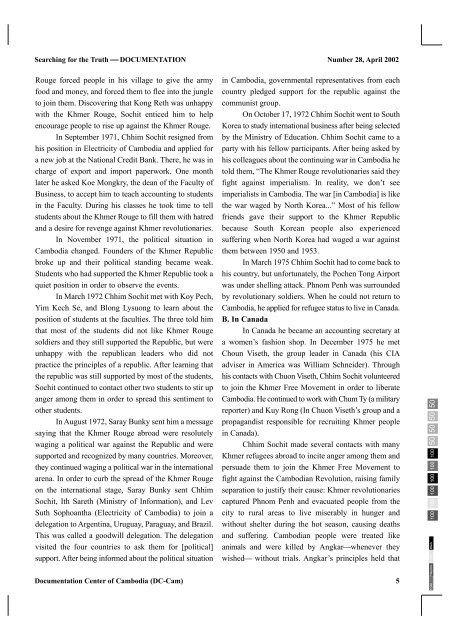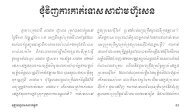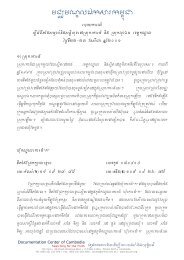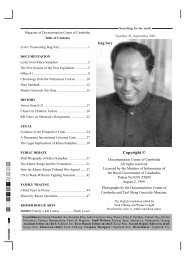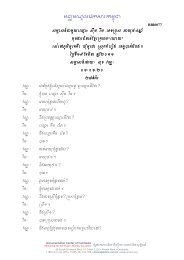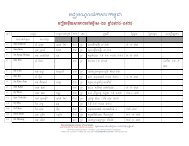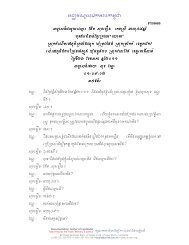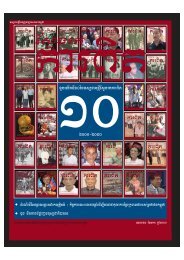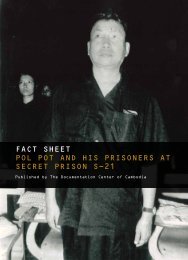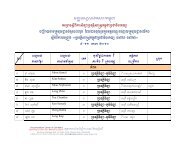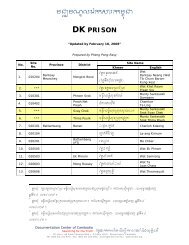Searching for the truth Issues 28 - Documentation Center of Cambodia
Searching for the truth Issues 28 - Documentation Center of Cambodia
Searching for the truth Issues 28 - Documentation Center of Cambodia
You also want an ePaper? Increase the reach of your titles
YUMPU automatically turns print PDFs into web optimized ePapers that Google loves.
<strong>Searching</strong> <strong>for</strong> <strong>the</strong> Truth ⎯ DOCUMENTATION<br />
Rouge <strong>for</strong>ced people in his village to give <strong>the</strong> army<br />
food and money, and <strong>for</strong>ced <strong>the</strong>m to flee into <strong>the</strong> jungle<br />
to join <strong>the</strong>m. Discovering that Kong Reth was unhappy<br />
with <strong>the</strong> Khmer Rouge, Sochit enticed him to help<br />
encourage people to rise up against <strong>the</strong> Khmer Rouge.<br />
In September 1971, Chhim Sochit resigned from<br />
his position in Electricity <strong>of</strong> <strong>Cambodia</strong> and applied <strong>for</strong><br />
a new job at <strong>the</strong> National Credit Bank. There, he was in<br />
charge <strong>of</strong> export and import paperwork. One month<br />
later he asked Koe Mongkry, <strong>the</strong> dean <strong>of</strong> <strong>the</strong> Faculty <strong>of</strong><br />
Business, to accept him to teach accounting to students<br />
in <strong>the</strong> Faculty. During his classes he took time to tell<br />
students about <strong>the</strong> Khmer Rouge to fill <strong>the</strong>m with hatred<br />
and a desire <strong>for</strong> revenge against Khmer revolutionaries.<br />
In November 1971, <strong>the</strong> political situation in<br />
<strong>Cambodia</strong> changed. Founders <strong>of</strong> <strong>the</strong> Khmer Republic<br />
broke up and <strong>the</strong>ir political standing became weak.<br />
Students who had supported <strong>the</strong> Khmer Republic took a<br />
quiet position in order to observe <strong>the</strong> events.<br />
In March 1972 Chhim Sochit met with Koy Pech,<br />
Yim Kech Se, and Blong Lysuong to learn about <strong>the</strong><br />
position <strong>of</strong> students at <strong>the</strong> faculties. The three told him<br />
that most <strong>of</strong> <strong>the</strong> students did not like Khmer Rouge<br />
soldiers and <strong>the</strong>y still supported <strong>the</strong> Republic, but were<br />
unhappy with <strong>the</strong> republican leaders who did not<br />
practice <strong>the</strong> principles <strong>of</strong> a republic. After learning that<br />
<strong>the</strong> republic was still supported by most <strong>of</strong> <strong>the</strong> students,<br />
Sochit continued to contact o<strong>the</strong>r two students to stir up<br />
anger among <strong>the</strong>m in order to spread this sentiment to<br />
o<strong>the</strong>r students.<br />
In August 1972, Saray Bunky sent him a message<br />
saying that <strong>the</strong> Khmer Rouge abroad were resolutely<br />
waging a political war against <strong>the</strong> Republic and were<br />
supported and recognized by many countries. Moreover,<br />
<strong>the</strong>y continued waging a political war in <strong>the</strong> international<br />
arena. In order to curb <strong>the</strong> spread <strong>of</strong> <strong>the</strong> Khmer Rouge<br />
on <strong>the</strong> international stage, Saray Bunky sent Chhim<br />
Sochit, Ith Sareth (Ministry <strong>of</strong> In<strong>for</strong>mation), and Lev<br />
Suth Sophoantha (Electricity <strong>of</strong> <strong>Cambodia</strong>) to join a<br />
delegation to Argentina, Uruguay, Paraguay, and Brazil.<br />
This was called a goodwill delegation. The delegation<br />
visited <strong>the</strong> four countries to ask <strong>the</strong>m <strong>for</strong> [political]<br />
support. After being in<strong>for</strong>med about <strong>the</strong> political situation<br />
<strong>Documentation</strong> <strong>Center</strong> <strong>of</strong> <strong>Cambodia</strong> (DC-Cam)<br />
Number <strong>28</strong>, April 2002<br />
in <strong>Cambodia</strong>, governmental representatives from each<br />
country pledged support <strong>for</strong> <strong>the</strong> republic against <strong>the</strong><br />
communist group.<br />
On October 17, 1972 Chhim Sochit went to South<br />
Korea to study international business after being selected<br />
by <strong>the</strong> Ministry <strong>of</strong> Education. Chhim Sochit came to a<br />
party with his fellow participants. After being asked by<br />
his colleagues about <strong>the</strong> continuing war in <strong>Cambodia</strong> he<br />
told <strong>the</strong>m, “The Khmer Rouge revolutionaries said <strong>the</strong>y<br />
fight against imperialism. In reality, we don’t see<br />
imperialists in <strong>Cambodia</strong>. The war [in <strong>Cambodia</strong>] is like<br />
<strong>the</strong> war waged by North Korea...” Most <strong>of</strong> his fellow<br />
friends gave <strong>the</strong>ir support to <strong>the</strong> Khmer Republic<br />
because South Korean people also experienced<br />
suffering when North Korea had waged a war against<br />
<strong>the</strong>m between 1950 and 1953.<br />
In March 1975 Chhim Sochit had to come back to<br />
his country, but un<strong>for</strong>tunately, <strong>the</strong> Pochen Tong Airport<br />
was under shelling attack. Phnom Penh was surrounded<br />
by revolutionary soldiers. When he could not return to<br />
<strong>Cambodia</strong>, he applied <strong>for</strong> refugee status to live in Canada.<br />
B. In Canada<br />
In Canada he became an accounting secretary at<br />
a women’s fashion shop. In December 1975 he met<br />
Choun Viseth, <strong>the</strong> group leader in Canada (his CIA<br />
adviser in America was William Schneider). Through<br />
his contacts with Chuon Viseth, Chhim Sochit volunteered<br />
to join <strong>the</strong> Khmer Free Movement in order to liberate<br />
<strong>Cambodia</strong>. He continued to work with Chum Ty (a military<br />
reporter) and Kuy Rong (In Chuon Viseth’s group and a<br />
propagandist responsible <strong>for</strong> recruiting Khmer people<br />
in Canada).<br />
Chhim Sochit made several contacts with many<br />
Khmer refugees abroad to incite anger among <strong>the</strong>m and<br />
persuade <strong>the</strong>m to join <strong>the</strong> Khmer Free Movement to<br />
fight against <strong>the</strong> <strong>Cambodia</strong>n Revolution, raising family<br />
separation to justify <strong>the</strong>ir cause: Khmer revolutionaries<br />
captured Phnom Penh and evacuated people from <strong>the</strong><br />
city to rural areas to live miserably in hunger and<br />
without shelter during <strong>the</strong> hot season, causing deaths<br />
and suffering. <strong>Cambodia</strong>n people were treated like<br />
animals and were killed by Angkar⎯whenever <strong>the</strong>y<br />
wished⎯ without trials. Angkar’s principles held that<br />
5<br />
100 100 100 100 100 100 50 50 50 50<br />
Black<br />
Yellow<br />
Magenta<br />
Cyan


